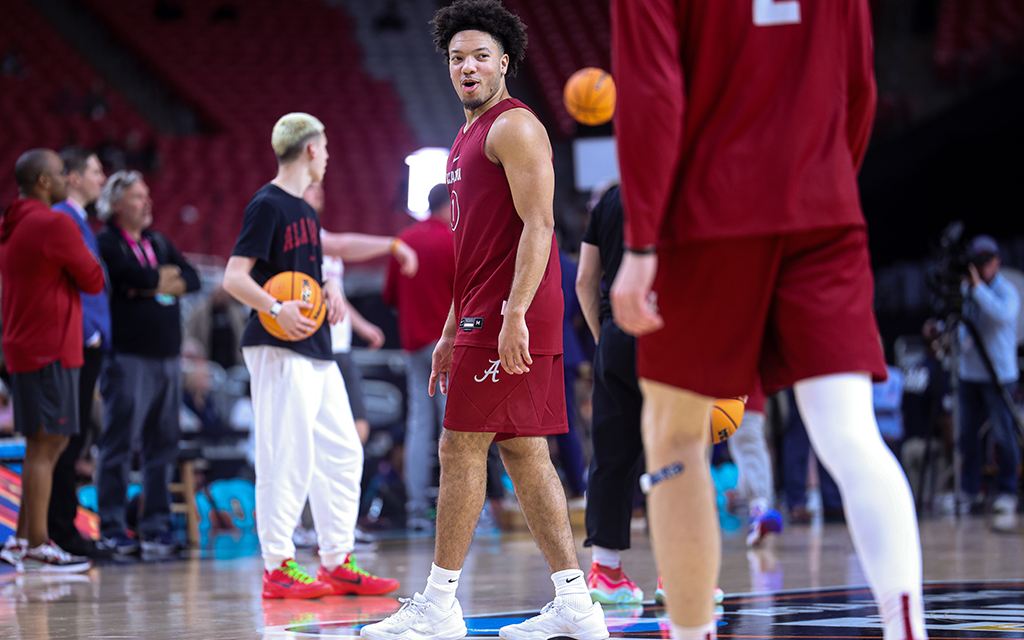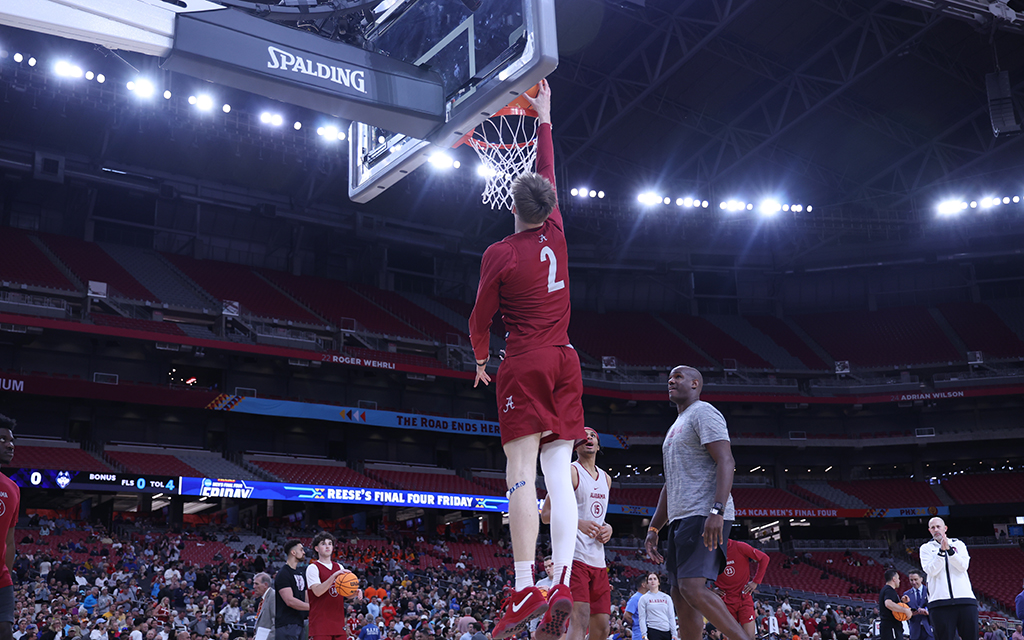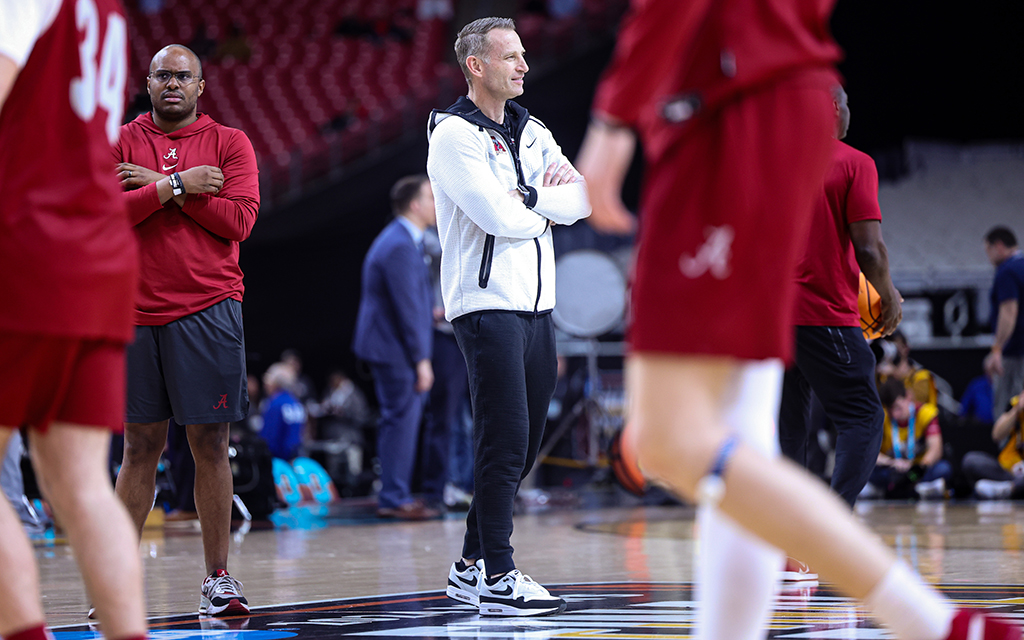PHOENIX – Alabama’s Nate Oats has hustled his entire career. Nothing was ever given to him, and he has never settled.
Before coaching in the college ranks, he took a job as a math teacher and basketball coach at Romulus High School in Michigan at the age of 27. He sold Flamin’ Hot Cheetos, Capri Suns and Pop-Tarts out of his office to earn gas money and fundraise for his program.
Across 11 seasons, he turned Romulus into a powerhouse high school program, leading the team to a 222-52 overall record and seven straight conference championships. Oats sought an eventual assistant coaching position at the Division I level, but he also arrived at a place of satisfaction if he decided to stay with the Eagles for the rest of his career.
“We were successful at Romulus,” said Oats, whose Crimson Tide take on Connecticut Saturday in the Men’s Final Four. “We were winning. Good retirement plan as a schoolteacher.”
He had this mindset from seeing the success of Naismith Basketball Hall of Fame basketball coach Bob Hurley Sr. at St. Anthony High School in Jersey City, New Jersey. If Hurley could do it, why couldn’t Oats?
“I had come to grips, if Bob Hurley Sr. can be a Hall of Fame coach – I think he had multiple Division I head coaching jobs he turned down to stay at St. Anthony’s – and we were nowhere close to St. Anthony’s at Romulus,” Oats said. “I’m not trying to compare the two programs. But the fact that he stayed at the high school level, and everybody knew him and he was great, I could stay here and be a very successful basketball coach and be happy with it.
“Well, it seems like every time you kind of get that way in life, then a pretty good opportunity comes up.”
And of course, an opportunity emerged in 2013 and Oats didn’t settle. The person that gave Oats his first DI coaching position was coincidentally from the same family that convinced him he could be content staying at the high school level. That man was current Arizona State men’s basketball coach Bobby Hurley, who was then at the helm of Buffalo and hired Oats as an assistant.
Hurley and his younger brother, Dan, were first introduced to Oats while the two were coaching at Rhode Island. The brothers – with Dan as the Rams’ head coach and Bobby in an associate role – were on a recruiting trip to Romulus to scout Oats’ top prospect, E.C. Matthews.
Dan Hurley couldn’t help but notice the similarities between Oats’ program and his father’s. Bob Hurley Sr. – who won 28 state high school championships at St. Anthony – ran his game day shootarounds and film sessions at the quality of the college level, according to Dan. His Dad even cooked the pregame meal.
“(Oats) was running a college program in high school, just like my dad,” Dan Hurley said. “That was the thing I noticed about Nate when we recruited E.C. … This guy’s wired different, number one. A different level of energy about him, just the way he shows up when you meet him. Then just the way he ran his program. I went and watched them before a state tournament game have one of the most detailed video scouts that you’ll see. In the back, they had spaghetti cooking on the stove.”
Oats would ultimately get a head coach opportunity at Buffalo, succeeding Bobby Hurley. He produced immediate results and catapulted his success into earning the head job at Alabama. Now in his fifth year with the Crimson Tide, his journey has come full-circle as he gets set to face Dan’s Connecticut Huskies Saturday in the Men’s Final Four.
Regardless of how unglamorous his path was, Oats has no regrets. He even feels it put him in a better position today than other coaches.

Mark Sears and his teammates have found that coach Nate Oats has tried to create a family atmosphere in addition to preaching tough love. (Photo by Bennett Silvyn/Cronkite News)
“I wouldn’t trade my route for anything because I got experience at that in different ways like a lot of these coaches don’t get,” Oats said. “If you haven’t coached at a high school level, you have no idea what it’s like to be on the other side of the recruiting table. I had 18 kids go play Division I. I took a lot of them on visits. I took E.C. Matthews on an unofficial visit to Rhode Island, drove him out there from Detroit to Rhode Island, sat in on all the meetings.”
At Romulus, Oats didn’t have the spotlight. He didn’t mind it and thrived without it. This gave him the opportunity to experiment in his coaching tactics, a luxury that many college coaches don’t have.
“One year we pressed the whole year, found out what worked, didn’t work,” Oats said. “If you do that at this level and it doesn’t work, you may get fired after a year. If they fire me from being a coach at Romulus, it only takes like $4,000. I’m still good as a teacher. I still got my math job.”
Those years of courage and experimentation have given rise to one of the brightest minds in college head coaching today. Oats has rapidly led Alabama to new heights, including two Sweet 16 appearances and now the program’s first ever Final Four birth.
He has an adherence to the modern NBA model with his use of analytics and positionless lineups, emphasizing the importance of efficient shots at the rim and behind the 3-point line. Oats even hired a third-party analytics company that has traveled with the team during the tournament run. He said he’s not afraid to shoot 50 3-pointers in a game if his opponent takes the paint away, as long as they are good looks.
“It was definitely a thing that I had to learn because obviously in high school, I had free range to basically do whatever I wanted to do,” said freshman forward Sam Walters, a four-star prospect. “I was just focused on not taking super contested threes and non-rim twos, which I always took a lot in high school, like some of those bad floaters. So I eliminated those from my game and was able to be more successful with that as the season went on.”
But as well as a coach can draw up a game plan, he has to have the ability to build relationships with his players on and off the court.
Alabama athletic director Greg Byrne first realized Oats had that skill while finalizing the coaching hire in 2019. Byrne reached out to one of Oats’ former players, who was a power forward/center playing at Compton Community College before joining Buffalo. He was about to sign a Division II scholarship, but the Bulls’ coaching staff contacted the player just before his decision.
“They said don’t sign there, sign with us at Buffalo,” Byrne said. “He goes to Buffalo playing the four or the five – they turned him into a point guard. He said, ‘Coach Oats got in the gym with me and taught me the game in ways I’ve never understood it before.’ He said, ‘He cared about me as a person’ and he said, ‘I’m now over in Greece making a good income, playing professionally that I wouldn’t have made without him just investing himself in (me) the way he did.’”
This story sealed the deal for Byrne to make the hire. Since joining the Crimson Tide, Oats has maintained the same care for his players. When Walters was struggling earlier in the season, Oats picked him up and took him to Oats’ house for a one-on-one dinner.
“He was just talking to me, showing me stats of other guys who were freshmen saying, ‘Every freshman goes through struggles,’” Walters said. “Just telling me it’s normal and continue to work. The next game I played way better.”
Senior forward Grant Nelson has golfed with Oats multiple times, saying he has a good sense of humor and “knows how to mess with people a little bit.”

Senior forward Grant Nelson said coach Nate Oats is “not afraid to yell at guys, he’s not afraid to coach guys up.” (Photo by Bennett Silvyn/Cronkite News)
“When I went (golfing) with Grant, I think I beat him by like one,” Oats said. “He can hit it a long ways. He’s a little inconsistent like me. I don’t hit it near as long as him.”
Once again, Oats’ knack for player relationships can be traced back to Romulus. As a full-time math teacher, Oats taught five hours of math – including Algebra 1, Geometry and Statistics – with students of all grade levels.
“It was easier to build relationships with my players in high school because I’d get them every day in class, even in the offseason,” Oats said. “At college, you have to create different ways to build it with them outside the basketball floor.”
At Alabama, Oats has friendly competitions with his players at the billiards, ping-pong and shuffleboard table. He’s nearly 50 and has an irreparable raspy voice, but his youth-like energy still shines.
“The day before we left for the tournament, they got a new Popstroke mini golf thing in Tuscaloosa, we took the team out for that,” Oats said. “Just get away, don’t talk basketball, hang out. Let them see you as a real person. I think it works a little bit.”
But don’t be fooled by this calm and cool guy – there’s a Dr. Jekyll and Mr. Hyde aspect of the fifth-year Alabama coach. On the court, Oats brings a fiery intensity to get the most out of his players. After nearly every score, he can be seen furiously fist-pumping, clapping or circling his arms to direct his team to push the pace (Alabama is ninth in Kenpom’s adjusted tempo rating).
Walters said that Oats is the hardest coach he has played for, transforming him into a mentally tougher player.
“He’s an intense coach, which I like,” Nelson said. “He’s not afraid to yell at guys, he’s not afraid to coach guys up. It’s just fun seeing him be a different person on and off the court.”
Oats has been able to strike this balance through his trust and relationships with his players. At Romulus, he said he strived “to be the hardest-working coach in the state of Michigan so I could build their trust.” He has carried this character over to Tuscaloosa, and it has allowed him to get the most out of his players.
“I’ve gotten on (senior guard) Mark (Sears) over this year,” Oats said. “We needed him to guard a little better, we need to play a little harder. He’s gotten it. But you can get on him without being disrespectful, and have a relationship with them, get their respect, build it, get them to play hard. All of that’s pretty similar to high school, college, all of that.”
At the same time, who wouldn’t want to play for Oats? His system is a player’s dream scenario in which nearly everyone has the green light to shoot. In the Tide’s Elite Eight matchup against Clemson, freshman forward Jarin Stevenson – who shoots under 32% from distance this season – hit a career-high 5-of-8 3-pointers and finished with 19 points.
How does he get these performances out of his players? It’s yet another Oats personal touch.
“(It’s) just him constantly giving confidence, saying before you even shoot, ‘Oh that’s in. That’s knockdown,’” Sears said. “Just him saying those little things, that gives the player all the confidence in the world.”
One would think that Oats feels validated as a head coach after reaching such a milestone destination, but he won’t let himself think that way. He’s still as hungry as he was while at Romulus.
His players share the same mentality. Five of Alabama’s top six scorers are transfers from mid-major schools. Sears, a three-star recruit who started his career at Ohio, has blossomed into an NCAA All-American this season. Oats and his unit have silenced the doubters by taking a different path to success.
“I’m just a high school guy that caught a break that’s still trying to prove that I belong at this level,” Oats said. “I think those guys are mid-major players with a chip on their shoulder. They played well enough that now they get an opportunity to prove that they belong at this level, and they’re still trying to prove it to this day. They’re going to try to prove it Saturday that they belong at this level.”
After the Crimson Tide lost in the SEC Tournament, marking three losses in its last four games, Oats turned to an Alabama coaching legend for advice: Nick Saban.
Saban told him about “the next” mindset. The next play. The next action during a play. The next game. It recentered the Tide at its most crucial point of the season.
“I think it’s a great philosophy in life,” Oats said. “There’s a lot of adversity you hit in life. What’s the next best action? Shoot, you go through all kinds of things in life. Move to the next one and make that the best one possible.
“You live in the past, you’re not going to be very good in the present. So we’ve been trying to move to the next play, the next action, the next timeout, just next, next, next. Our guys have been doing a pretty good job of it the last four games.”
So what’s next? A matchup with the title favorite and Oats’ coaching companion in which seemingly no one is picking Alabama to come away victorious. Not ideal circumstances. Does Oats care? Likely not. He’s driven by one thing.
“He wants to win so bad, more than any other coach I’ve probably played for,” freshman forward Mouhamed Dioubate said. “He says the most prepared team wins. So Oats, he’s just different. He’s a basketball junkie … he’s just in love with this game so much.”
Saturday will be another moment in Oats’ coaching career that won’t be earned. The Tide will have to take it. And think twice if you believe the former hustling high school coach is settling for it to be his last game this season.
“While I don’t want to take anything away from making a Final Four, because it’s special, it’s something that’s never been done in school history,” Oats said. “But there’s still two games to be played. The biggest championship of all is still sitting in front of us. We need to get locked in and play it.”


